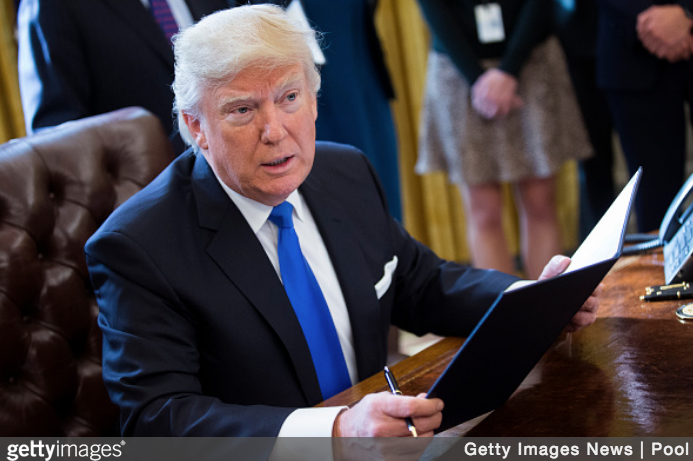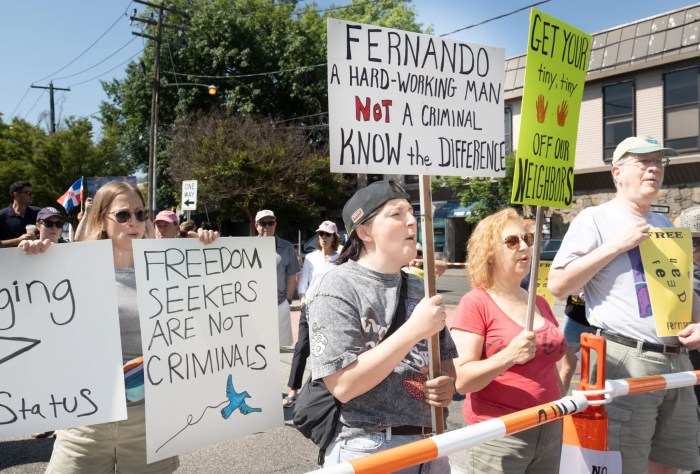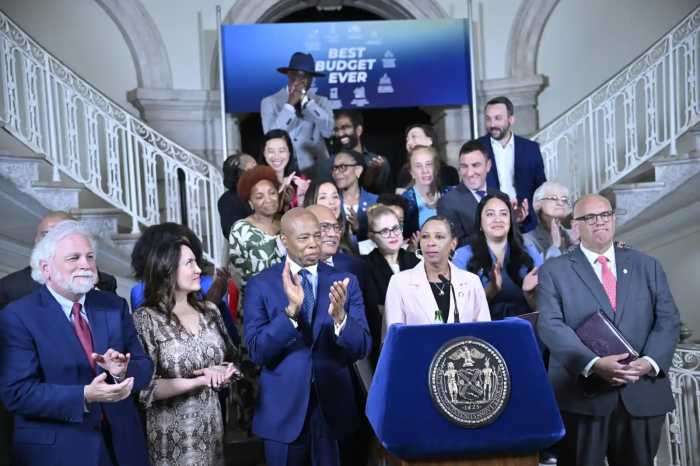Call it what it is: a Muslim ban.
That was the response from Muslim American advocacy groups disturbed by President Donald Trump’s plan to stall refugee resettlement in the United States and suspend visa access to immigrants from seven predominantly Muslim nations, including Syria and Iraq.
“We see it as a Muslim ban,” Abed Ayoub, national legal and policy director for the Washington, D.C.-based American-Arab Anti-Discrimination Committee (ADC), told the Press. “Effectively they’re circumventing calling it a Muslim ban by just listing the countries.
“This is what he promised during his campaign, and this is the direction they’re going,” he added.
Trump is expected to announce this week new executive orders restricting immigration. The directive, according to Reuters, would force a temporary ban on “some refugees” and curb visas for nationals from Syria, Iraq, Iran, Libya, Somalia, Sudan and Yemen—all majority Muslim nations in the Middle East and Africa.
The president’s executive order would satisfy, to some extent, one of his most controversial campaign promises: banning people from Muslim countries from entering the United States.
During the rancorous presidential primaries, Trump called for a “total and complete shutdown of Muslims entering the United States.” Democrats vociferously attacked the proposal as intolerant, unfair and un-American. Even some top Republicans, including House Speaker Paul Ryan and South Carolina Gov. Nikki Haley, spoke out against it. Trump later softened his stance on Middle East immigration, pivoting to what he called “extreme vetting” of those seeking entry into the country.
The new administration had also been considering reinstating a widely criticized and dormant immigration tracking system that the Department of Homeland Security ended in 2011 after officials determined it to be redundant and ineffective. The program had not led to one terror investigation, but did cause the deportation of thousands from Muslim nations. In his final weeks in office, President Barack Obama dismantled the legal framework for the program, effectively killing it.
Although Trump and his fellow Republicans have been outspoken about Obama’s relatively modest resettlement of Syrian refugees here (13,210 as of Nov. 1, 2016), humanitarian groups have said the United States maintains the most arduous program of any nation, including multi-layered screenings from various law enforcement agencies.
The reaction to Trump’s plan to stall Muslim refugees and suspend visas was swift.
“This sends a message that the current administration sees the Muslim community and their faith as a threat to America’s national security,” Rabiah Ahmed, director of media and public affairs for the Muslim Public Affairs Council, told the Press. “It criminalizes our faith by having a ban on immigration policies by targeting Muslim majority countries.”
Trump’s new policies reportedly would not impact religious minorities from the listed countries. Ahmed called that exception “code language for anybody but Muslims.”
“The facts show that communities that are impacted the most, that are victims of ISIS, are Muslims themselves,” she added, referring to the so-called Islamic State currently fighting to hold onto its territory in Syria and Iraq. “But facts don’t seem to matter much with this current administration. It’s a world view that they have, and they construct it as they see it.”
ADC’s Ayoub said advocacy groups such as his have been preparing for harsh immigration actions since Trump was elected.
“This is what we expected, unfortunately,” he said. “This is a long-term fight. This is not an administration that is going to bow down to pressure or change their mind overnight. So it’s going to take aggressive advocacy and aggressive legal work to address these issues. We’re in it for the long haul.”
Besides exploring legal action, ADC is engaged in conversation with a coalition of civil rights groups to better explain how Trump’s executive actions could impact all immigrants in the United States. Besides targeting Muslims, the president said Wednesday that he signed an executive action leading to the “immediate” construction of a wall along the southern border with Mexico, which was a big crowd-pleaser at his campaign rallies.
“We’re in the middle of a crisis on the southern border,” Trump said during an appearance at the Department of Homeland Security. “A nation without borders is not a nation. Beginning today, the United States of America gets back control of its borders.”
Trump’s executive actions would also end “catch and release” at the border and impose a crackdown on so-called sanctuary cities that refuse to enforce federal immigration measures. He also promised to bolster the ranks within DHS by the thousands.
An announcement about his plans for travel and refugee bans from Muslim nations could reportedly come on Thursday.
While Trump’s supporters are likely to cheer his immigration actions, the majority of the country opposes the construction of a wall (63 percent) and a ban on Muslim immigration (68 percent), according to a recent ABC News/Washington Post poll.
“This is not only an attack on Arabs and Muslims. It’s an attack on all immigrants,” Ayoub said. “And we need to work together and tell them: No ban, no wall, and do what we can to prevent these actions from taking place.”
Albert Cahn, director of strategic litigation for the New York chapter of the Council on American-Islamic Relations, said the organization is currently evaluating “a range of legal responses” to the expected immigration actions.
“We believe that the proposed orders are being driven primarily out of bigotry and discrimination, not out of any evidence-based approach to making the country safer,” Cahn told the Press. “The anticipated restriction on travel from individuals in several Middle Eastern countries will not do anything to improve the safety of this country and will reinforce the worst forms of anti-Muslim bigotry and discrimination.”
In response, CAIR-NY plans to hold a rally at Washington Square Park Wednesday night to oppose the expected actions on curtailing entry for citizens from Muslim nations and to stand in solidarity with undocumented immigrants, Cahn said.
Javier H. Valdés, co-executive director of Make the Road New York, a non-profit group based in Brooklyn that supports Latino immigrants, also questioned Trump’s actions.
“As we hear about Donald Trump’s plans to attack immigrant communities, we reject Trump’s xenophobia and his efforts to vilify immigrant families,” said Valdés in a statement. “We know from decades of experience that efforts to invest more money in rogue enforcement agencies that delight in causing human suffering and depriving people of their Constitutional rights will be a grave and costly mistake. We have one message for the President: We are here to stay, and we will stand firm in our effort to keep families together.”

































